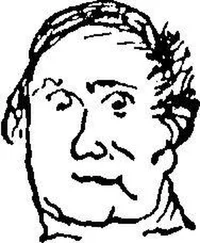1 ...8 9 10 12 13 14 ...19 In an instant that good little boy shot out through the roof and soared away toward the sun with the fragments of those fifteen dogs stringing after him like the tail of a kite. And there wasn’t a sign of that man or that old iron-foundry left on the face of the earth. As for young Jacob Blivens, he never got a chance to make his last dying speech after all his trouble making it up, unless he made it to the birds. Although the most of him came down all right in a tree-top in an adjoining county, the rest of him was found in four different places. So they had to hold five inquests on him to find out whether he was dead or not, and how it occurred. You never saw a boy scattered so.
Thus perished the good little boy who did the best he could, but nothing ever happened to him according to the books. Every boy who ever did as he did prospered except him. His case is truly remarkable. It will probably never be remembered.
The Story of the Bad Little Boy
Once there was a bad little boy whose name was Jim, though, you may notice that bad little boys are nearly always called James in your Sunday-school books. It was strange, but still it was true, that this one was called Jim.
He didn’t have any sick mother. Most bad boys in the Sunday books are named James, and have sick mothers, who sing them to sleep with sweet voices, and then kiss them good night, and kneel down by the bedside and weep. But it was different with this fellow. He was named Jim, and there wasn’t anything the matter with his mother. She was rather stout than otherwise, and she was not anxious on Jim’s account. She said if he were to break his neck it wouldn’t be much loss. She always spanked Jim to sleep, and she never kissed him good night.
Once this little bad boy stole the key of the pantry, and slipped in there and ate some jam, and filled up the jar with tar, so that his mother would never notice. No terrible feeling came over him, and nothing \ whispered to him, “Is it right to disobey my mother? Isn’t it sinful to do this? Where do bad little boys go?” Then he didn’t kneel down all alone and promise never to be wicked any more, and go and tell his mother all about it, and ask for her forgiveness. No; that is the way with all other bad boys in the books; but it happened otherwise with this Jim, strangely enough. He ate that jam, and he put in the tar, and laughed. When his mother found it out, he denied knowing anything about it, and she whipped him severely. Everything about this boy was curious — everything turned out differently with him from the way it does to the bad Jameses in the books.
Once he climbed up his neighbor’s apple tree to steal apples, and the branch didn’t break, and he didn’t fall and break his arm, and get torn by the farmer’s great dog. Oh, no; he stole as many apples as he wanted and came down all right; and he was all ready for the dog, too, and knocked him with a brick when he came to tear him. It was very strange — nothing like it ever happened in those little books with pictures in them of men with pantaloons that are short in the legs, and women with the waists of their dresses under their arms. Nothing like it in any of the Sunday-school books.
Once he stole the teacher’s penknife. When he was afraid it would be found out and he would get whipped, he put it into George Wilson’s cap poor Widow Wilson’s son, the good little boy of the village, who always obeyed his mother, and never told lies, and was fond of his lessons. And when the knife dropped from the cap, and poor George blushed, as if in conscious guilt, and the teacher said he was guilty, no feeling of justice appeared in Jim’s heart and no voice said, “Spare this noble boy!” So the model boy George was punished, and Jim was glad of it because, you know, Jim hated moral boys.
But the strangest thing that ever happened to Jim was the time he went boating on Sunday, and didn’t get drowned. And that other time that he got caught out in the storm when he was fishing on Sunday and didn’t get struck by lightning. Why, you might look, and look, all through the Sunday-school books from now till next Christmas, and you would never come across anything like this. Oh, no; you would find that all the bad boys who go boating on Sunday get drowned; and all the bad boys who get caught out in storms when they are fishing on Sunday get struck by lightning. It always storms when bad boys go fishing on Sunday. How this Jim ever escaped is a mystery to me.
Nothing could hurt this Jim. He even gave the elephant in the menagerie some tobacco, and the elephant didn’t knock the top of his head off with his trunk. He stole his father’s gun and went hunting on Sunday, and didn’t shoot three or four of his fingers off. He struck his little sister on the head with his fist when he was angry, and she didn’t die with sweet words of forgiveness upon her lips that redoubled the anguish of his breaking heart. No; she got over it. He went to sea at last, and didn’t come back and find himself sad and alone in the world, his loved ones sleeping in the graveyard, and the home of his boyhood gone to decay. Ah, no; he came home drunk and happy.
And he grew up and married, and raised a large family, and brained them all with an ax one night. [13] …and brained them all with an ax one night — …и однажды ночью разбил им всем головы топором.
He got wealthy by cheating. Now he is the wickedest scoundrel in his native village, and is universally respected, and belongs to the legislature.
So you see there never was a bad James in the Sunday-school books that had such a streak of luck as this sinful Jim.
I do not claim that I can tell a story as it should be told. I only claim to know how a story should be told, for I have been almost daily in the company of the most expert story-tellers for many years.
There are several kinds of stories, but only one difficult kind — the humorous. I will talk mainly about that one. The humorous story is American, the comic story is English, the witty story is French. The humorous story depends for its effect upon the manner of the telling; the comic story and the witty story upon the matter.
The humorous story may be long, and may wander around as much as it pleases, and arrive nowhere in particular; but the comic and witty stories must be brief and end with a point.
The humorous story is strictly a work of art — high art — and only an artist can tell it; but no art is necessary in telling the comic and the witty story; anybody can do it. The art of telling a humorous story — understand, I mean by word of mouth, not print — was created in America, and has remained at home.
The humorous story is told gravely. The teller does his best to conceal the fact that he suspects that there is anything funny about it; but the teller of the comic story tells you beforehand that it is one of the funniest things he has ever heard, then tells it with delight, and is the first person to laugh when he gets through. And sometimes, if he has had good success, he is so glad and happy that he will repeat the key sentence and look around from face to face, collecting applause, and then repeat it again. It is a pathetic thing to see.
Very often, of course, a humorous story finishes with a point or whatever you like to call it. Then the listener must be alert, for in many cases the teller will divert attention from that point by dropping it in a carefully casual and indifferent way.
But the teller of the comic story shouts the point at you every time. And when he prints it, in England, France, Germany, and Italy, he italicizes it, puts some exclamation marks after it, and sometimes explains it in a parenthesis. All of which is very depressing, and makes one want to give up joking and lead a better life.
Читать дальше
Конец ознакомительного отрывка
Купить книгу
![Марк Твен Смешные рассказы [The Funny Stories] обложка книги](/books/29189/mark-tven-smeshnye-rasskazy-the-funny-stories-cover.webp)










